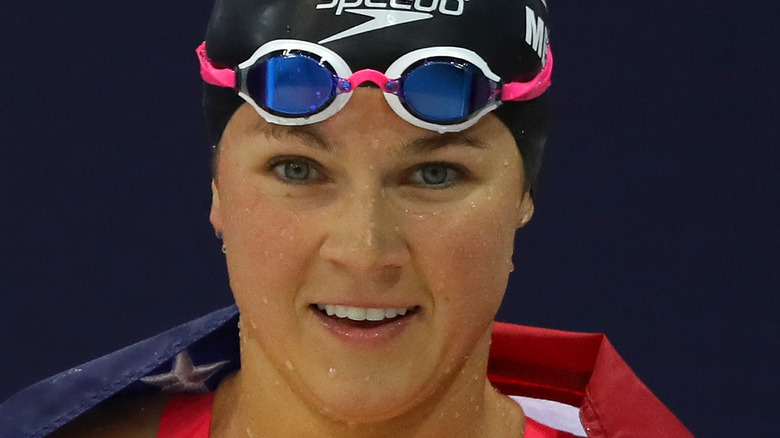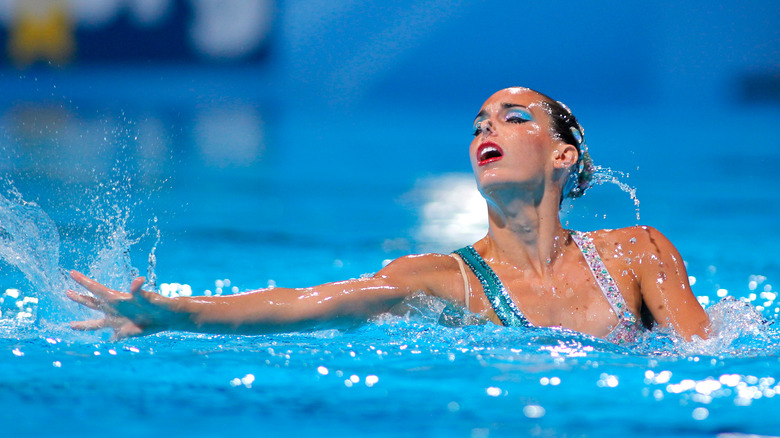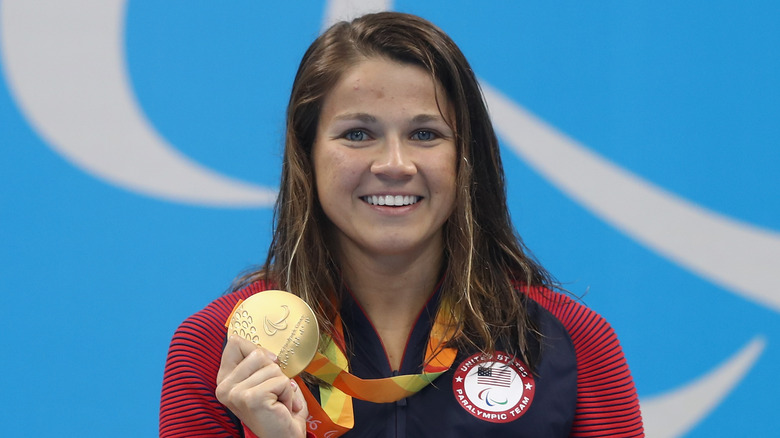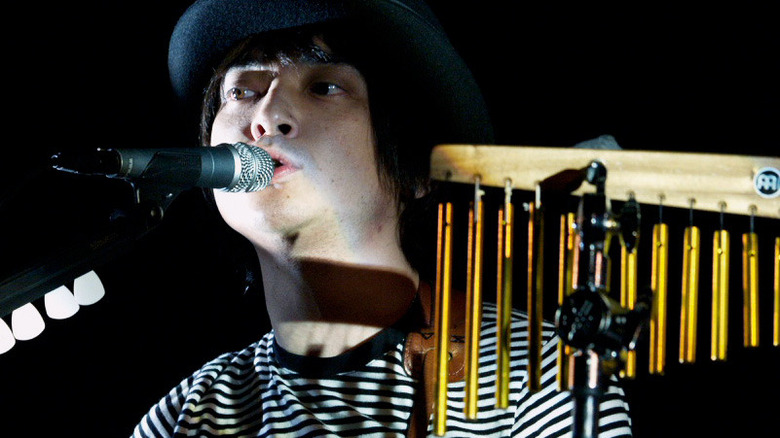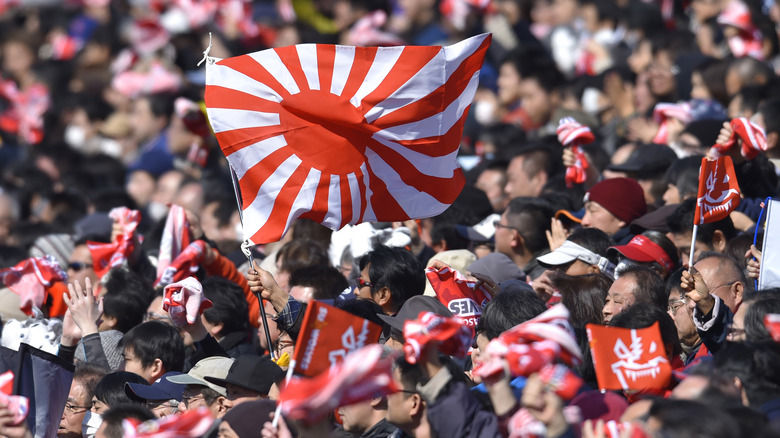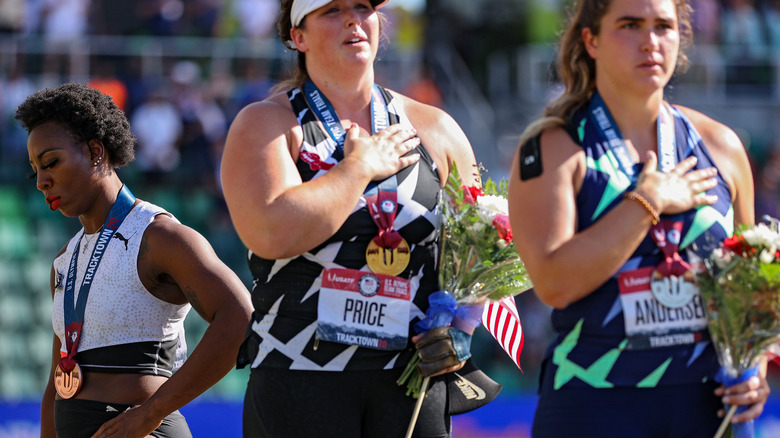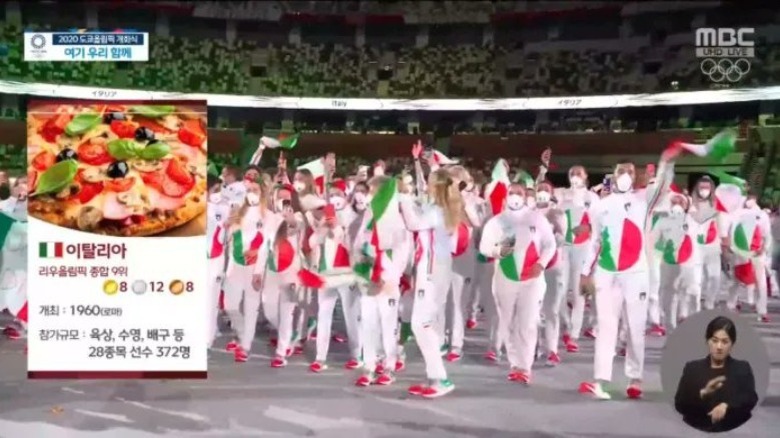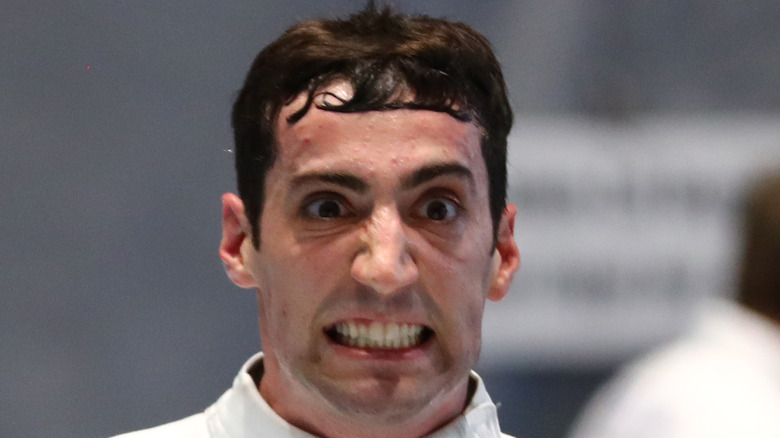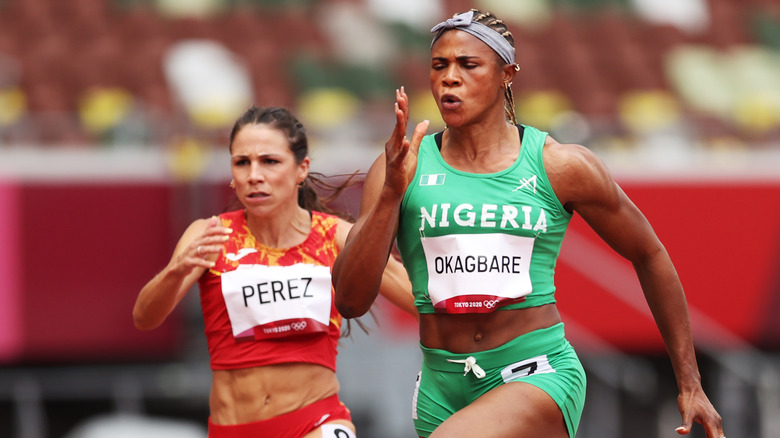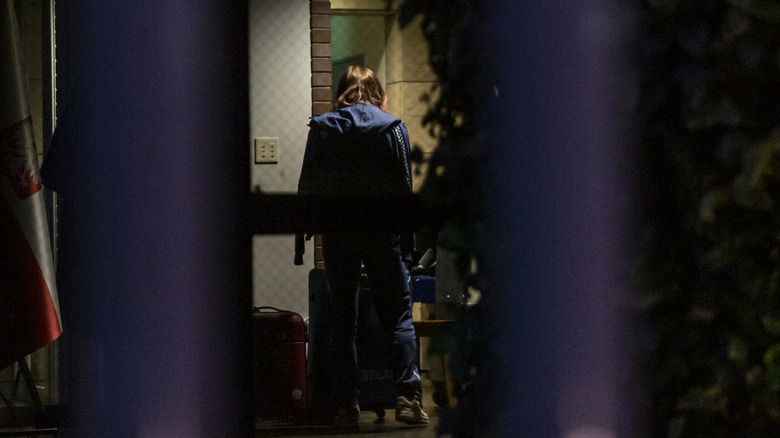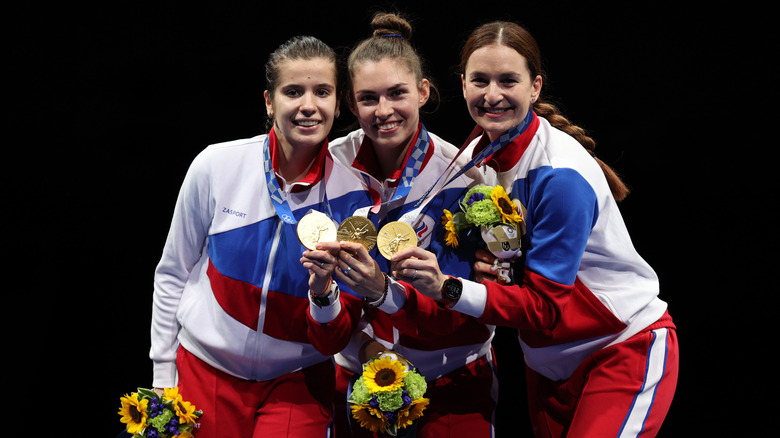The Biggest Tokyo 2020 Olympics And Paralympics Controversies
The Olympics have basically never gone off without controversy. When you take thousands of athletes from dozens of countries and put them together, while attempting to ignore the political realities of the world, you're pretty much just asking for trouble.
The modern revival of the games has seen boycotts, violence, and more doping scandals than you can shake an épée at. Heck, even Hitler got to host the Olympics in 1936, making that year's games one big scandal just by their very existence.
The delayed 2020 Tokyo Olympic Games had a whole extra year to iron out any thorny issues before they were finally held in 2021. But considering the restrictions neeeded to control COVID-19, it's perhaps not surprising that even before the Olympics began there were already plenty of scandals. And, unsurprisingly, people involved with the games have managed to put their foot in it, even when it's nothing to do with a deadly pandemic. Here are the biggest Tokyo 2020 Olympics and Paralympics controversies so far.
Breastfeeding mothers were forced to choose between competing and their children
The fact that some women can go through something as strenuous as pregnancy and labor, and then turn around and compete at the Olympic level is, frankly, astonishing. Mothers who make it to the games deserve a medal just for that. But, thanks to COVID-19 and some restrictions by the Olympics organizers, athlete mothers of infants had to make an incredibly hard choice in 2021.
Ona Carbonell, a Spanish artistic swimmer (what used to be called synchronized swimming), gave birth less than a year before the Tokyo Games began, and the athlete was planning to continue breastfeeding her son during the Olympic Games. However, according to the New York Times, Carbonell took to social media, saying that some athletes like herself were told they would have to choose "between family and breastfeeding or to participate in the Olympic Games." Originally, the Tokyo organizing committee said no babies at all. But about six weeks before the games opened, they changed their minds, but it still appears almost impossible to both compete and breastfeed.
As Carbonell detailed, her son "wouldn't be allowed to leave the hotel room during the 20-ish days I'd be in Tokyo. For me to go and breastfeed Kai whenever he needs it during the day I would have to leave the Olympic villa, the team's bubble, and go to their hotel, risking my team's health." Faced with the tough decision, Carbonell decided to compete and not bring her son to Tokyo, but it's a decision she probably shouldn't have been forced to make at all.
Paralympians were told to go without the help they need to function
In 2021, the control of COVID-19 has meant restrictions on the number of personnel both Olympic and Paralympic teams could bring with them to Tokyo. But while having fewer coaches there might be inconvenient but doable for Olympic athletes, some Paralympic athletes need more assistance to get through the games.
The Washington Post reported that Becca Meyers pulled out of the Tokyo Games when her needs as a deaf-blind athlete were ignored. In 2016, Meyers won three golds and a silver in swimming at the Rio Games. But she also had serious trouble getting around the Olympic Village, even stopping eating when she could not find the dining hall on her own. To compete in Tokyo, she was asked to go with no help at all. Meyers said, "When we had a meeting in May to discuss this [with the United States Olympic & Paralympic Committee], I presented my case and I said, 'Okay, how do we make this work?' They talked right over me. They dismissed me. They said, 'This is what we have; you're going to have to deal with it.'"
And Meyers is far from the only one affected. "The other athletes ... they're sort of fending for themselves ... I've talked to some of them, and they're afraid," Meyers is reported as saying. This is all the more infuriating when you learn that golf caddies and horse grooms are allowed to come with their teams to Tokyo.
Several men were fired for being horrible before the Tokyo Olympics started
While it's not uncommon for someone involved in the Olympics to be outted as a terrible person, Tokyo seems to be going for some sort of record. Even before the opening ceremonies, a number of men had been fired from their roles in the games.
Pajiba has a list (or one that's complete at time of writing, anyway). First, the president of the Tokyo organizing committee, Yoshiro Mori, received huge backlash when he opined that he found it "annoying" to attend meetings that included women, since he felt "they talk too much." He resigned. Then, the creative director for the opening and closing ceremonies, Hiroshi Sasaki, decided it would be a good idea to joke that they could dress a famous Japanese comedian up as an "Olympig" because she's plus sized.
Children's author Nobumi was part of the Tokyo Olympics' cultural program, until people realized he had happily admitted in his autobiography that he made fun of children with congenital disorders in school, as well as abusing his teacher. The director of the opening ceremonies, Kentaro Kobayashi, was fired when a clip of him making a joke about the Holocaust resurfaced. And last but certainly not least, Keigo Oyamada (a.k.a. Cornelius), the musical director of the opening ceremonies, was forced to resign just days before the games when an interview he gave to a magazine in the 1990s came to light, where he talked about making a mentally disabled classmate eat feces and perform a sex act in front of the class.
South Korea and Japan were feuding over offensive flags and banners
South Korea and Japan have some not-so-great history, and the legacy of this history still affects both sides deeply.
In 2019, AP reports, South Korea asked that Japan not be allowed to use the rising sun version of its flag at the Olympics. The International Olympics Committee (IOC) rejected the request, rationalizing that the flag "was widely used in Japan and was not considered a political statement." But for South Koreans, it is definitely a political statement. South Korean officials compared the rising sun flag to the swastika, since that is the version of the flag Japan was using when it colonized the Korean peninsula for 35 years in the first half of the 20th century.
Since the rising sun flag was not banned at the start of the 2020 Tokyo Olympics, South Korea decided to make its own statement. The country's athletes hung banners from the balconies of their rooms which said "I still have the support of 50 million Korean people." Seems perfectly innocuous, right? Well, it's meant as a call back to an admiral's famous words during a war with Japan in the 1500s. Yes. The Japanese lost the subsequent battle and is apparently still upset about it. The IOC eventually agreed to ban the rising sun flag if South Korea took down the banners.
Athletes were told not to protest
You've probably seen the famous picture of Tommie Smith and John Carlos on the podium, gold and bronze medals around their necks, after the 200-meter race at the 1968 Summer Olympics. It could have been any other medal ceremony, except during an unbelievably politically charged year in world history, they raised their fists in a show of Black power. For breaking Rule 50 of the Olympic Charter, they were suspended from the U.S. team and kicked out of the Olympic Village.
Rule 50, which is still in place today, states: "No kind of demonstration or political, religious, or racial propaganda is permitted in any Olympic sites, venues or other areas." You can see why this might be an issue at the Tokyo Olympics, at a time where kneeling and wearing Black Lives Matter clothing is common for athletes. Before the Olympics even started, Gwen Berry was criticized by some people for turning away during the National Anthem when she made the hammer throw team at the U.S. Olympic trials.
At first, the International Olympic Committee tried to invoke Rule 50, saying any demonstrations would get athletes in trouble. But after groups like Global Athlete and the World Players Association union told athletes to basically do what they want, consequences be damned, the IOC backed down. A little. As reported by the AP, athletes can now make a gesture of protest "after leaving the 'call room' (or similar area) or during the introduction of the individual athlete or team."
A South Korean TV station aired offensive images during the Parade of Nations
When you think of Italy, you might think of its beautiful ruins, art, music, gorgeous scenery, good wine, and good food. Or, you could ignore 99% of that storied culture, and reduce it to the country that invented pizza.
That's exactly what one television station in South Korea chose to do during the opening ceremony of the Tokyo Olympics. And look, everyone understands the difficulty television announcers have at such events. The Parade of Nations is long and boring, and you have to fill the time somehow. Plus you can't repeat the things you did or said during the last Olympics about countries you're not very familiar with. But reducing each country to a single stereotypical, offensive, or just plain depressing image and caption is not the way to go.
As reported by the Japan Times, as athletes from the Marshall Islands entered the stadium, South Korea's MBC channel informed viewers that the country was "once a nuclear test site for the United States." And who could forget Syria, best known for being the country that has had "a civil war going on for 10 years." Is there a better way to celebrate the world-class athletes from Ukraine than putting an image of a melted-down Chernobyl on the screen next to their happy faces?
After international outcry, MBC released a statement acknowledging that "inappropriate images and captions were used to introduce some stories. We apologized to those countries including Ukraine and our viewers."
A fencer under investigation for numerous assaults still made the US team
When Alen Hadzic made the U.S. Olympic fencing team in 2021, it almost immediately caused an uproar in the sport. See, no matter how good he was at fencing, Hadzic was under multiple investigations for sexual assault, according to Buzzfeed News. Within days, six women, including two current Olympians, put their concerns in writing and then told the media. One said that Hadzic has "been protected again and again." She said that if authorities had dealt with the issue before now, he wouldn't have even been able to try out for Team USA, and "now we have to deal with the consequences of having a predator on the team while simultaneously competing in the biggest event of our lives. And I think that's a very unfair position to put us in."
At first their actions worked, and Hadzic was banned from international competition. But he got this reversed on appeal. So USA Fencing came up with a "safety plan" to keep him away from teammates, from taking a separate plane to the event, and staying outside of the Olympic village, to not letting him practice around female teammates. (Note: If you need a detailed plan so someone can't sexually assault women, maybe they shouldn't be there at all.)
Hadzic says that the accusations are "untruths," while his attorney, Michael Palma, says even minor limitations like not being able to stay in the Olympic Village keep his client "from participating in the Olympic experience that he has rightfully earned."
Nigeria's drug testing issues
Imagine showing up to the Olympics, after waiting an extra year to go, hanging around for a week while you wait for your events to begin, all while following strict COVID-19 procedures and staying mentally and physically ready ... only to be told you can't compete. The BBC reports that that's what happened to 20 athletes, a full 10 of whom were from one country: Nigeria.
It came down to drug testing. But not because these 10 athletes failed drugs tests — rather, they hadn't been tested enough. Many of them were at college in the United States, and not enough tests –- or tests that didn't meet World Anti-Doping Agency guidelines — were administered to them in the runup to the games.
Nigerian athlete Blessing Okagbare, who was unaffected by the issue, was furious for her teammates, tweeting, "The sport system in Nigeria is so flawed and we athletes are always at the receiving end of the damages." The Athletics Federation of Nigeria (AFN) took responsibility, saying, "The AFN bears responsibility for any lapses that may have occurred during the process and reassures Nigerians that our performances will not be negatively impacted ... It must be noted that no Nigerian athlete tested positive [for] prohibited substances."
Two days after that statement was issued, it was reported thatBlessing Okagbare had tested positive for a banned substance. Human growth hormone was found in a sample from July 19, and she was banned from further events just days before she was expected to run in the women's 100-meter final.
The Belarusian runner who was afraid to return home
According to the Washington Post, like some other athletes who thought they could compete in the Olympics, members of the Belarus 4x400 relay had not had the correct doping tests and didn't qualify to run in the race. Krystsina Tsimanouskaya was already in Tokyo when she was told she'd be replacing one of them –- despite the fact she'd never even trained for the relay. Taking to Instagram to vent her displeasure, she posted, "It turns out that our 'very cool' leadership has once again decided everything for us. Why do we have to pay for your mistakes?"
Then, before she'd competed in her events, she was told by her country's Olympic officials to pack her bags, and frog-marched off to the airport. The official statement from the Belarus Olympic committee said, "According to the doctors' opinion, due to the emotional and psychological state of Krystsina Tsimanouskaya, the participation of the athlete was withdrawn."
Despite the fact she had only criticized the athletic leadership, not the country's dictator, Tsimanouskaya was terrified to return home. At the airport, she posted a video, saying, "I am asking the International Olympic Committee for help, I have been pressured and they are trying to take me out of the country without my consent, so I am asking the IOC to intervene." With the help of Japanese authorities and others, she received a humanitarian visa from Poland, and was photographed at the Polish embassy in Japan (pictured).
Russia's involvement despite being banned
It's common knowledge that Russia was temporarily banned from the Olympics because the nation took part in the largest state-sponsored doping scandal ever. There was even a documentary about it, as the Economist points out. It won an Oscar. So why are so many Russian athletes at the Tokyo Olympics, winning a ton of medals?
Turns out, as long as they pass rigorous drug tests, don't display their flag or play their national anthem, and don't call themselves "Russia" but go by the thinly veiled "Russian Olympic Committee," it's not a problem for Russia to compete. A whopping 355 Russian athletes are competing in Tokyo. The Washington Post reports that at the end of day seven of the games, Russia – sorry, ROC – was third on the medals table. Some punishment for unprecedented levels of cheating, right?
And no one is buying it. While some Russian athletes have been a bit bummed, with swimmer Kliment Kolesnikov saying, "Maybe deep in my heart, I do feel sad that we couldn't hear the national anthem on the podium," (instead the intro of Tchaikovsky's Piano Concerto No. 1 is played) mostly, no one cares about the slap on the wrist. The New York Times interviewed Russians back home, who, if anything, seemed happy about the attention their team was getting. "It doesn't prevent us from being proud," one Russian said. "It doesn't matter if they compete under the Olympic flag. They are still Russians. And when they win, it causes positive emotions."
